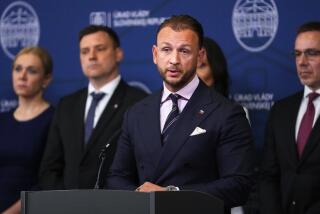Eloquence of Uncompromising Priest Raises Spirits of Czechoslovak Opposition
- Share via
PRAGUE, Czechoslovakia — If there was a moment when Czechoslvakia’s opposition seemed suddenly vulnerable and hesitant, it came last Sunday with the shock that days of mass protests had produced a new government still dominated by Communists.
Spirits tumbled as doubts surfaced that Civic Forum for the first time had seriously erred by halting its mass demonstrations too early and refusing to offer names for the new government.
The large crowd that gathered in the city’s main Wenceslas Square the following day to renew its protests seemed uncertain and worried.
Demonstrators stirred when the opposition’s leading personality, playwright Vaclav Havel, appeared briefly. But in the fading December afternoon light, it was another figure who would revive the movement that day--a no-nonsense dissident Roman Catholic priest named Vaclav Maly.
After an unexplained absence of several days, Maly emerged onto the speaker’s balcony to deliver a stinging denunciation of the “neo-Stalinist” attempt to hold power.
The crowd erupted to life. It cheered, chanted, and clapped as Maly went on to announce the de facto birth of Civic Forum as a political party.
In the 12 minutes he spoke, the opposition had regained its focus. It was moving again.
“It was the opposition’s political keynote,” commented a Western diplomat. “It drew a new line.”
For those who know the 39-year-old priest, the performance wasn’t surprising.
Among an opposition sprinkled with intellectuals quick to stress the moral nature of Czechoslovakia’s opposition movement, Maly has provided the hard-edged voice of its realpolitik.
“In terms of political smarts, he’s one of the few in Civic Forum who’s got them,” said a veteran diplomat who has watched the country’s opposition movement develop. “He’s not afraid of being tough.”
Added another Western diplomat: “He’s strong, he’s stubborn, he’s uncompromising.”
When the National Assembly voted last week to abolish the Communist Party’s leading role, Maly dismissed it as “cosmetic.” He wanted more.
While he and other opposition figures play down differences within the opposition, Maly was absent for several crucial days before last Sunday’s new government was announced, amid reports that he had failed to persuade Havel to maintain pressure on the Communist prime minister, Ladislav Adamec.
As urgent talks began early this week to produce a more balanced national government, Maly’s presence as a key Civic Forum tactician is seen as an important reason for the group’s tougher stand.
During a brief, hectic interview at the new Civic Forum headquarters, Maly underscored his uncompromising anti-Communist stand.
“For me, there are no reformists in the Communist Party,” he said. “There are only those who try to accommodate to save themselves.”
Maly appraisal is similar to that of another opposition figure, economist Valtr Komarek, who dismissed those who talk of compromise with Communists as romantics.
While Havel talks of a willingness to work with Communists and rejects the idea of revenge against the hard-liners installed by the Soviet-led 1968 invasion, Maly wants retribution.
“The people responsible for these 20 disastrous years must be sentenced,” he said. “Some are more responsible, some are less so. They should be judged on objective grounds.”
In part, these differences reflect the contrasting backgrounds of the two opposition figures.
Havel was born into a wealthy family, has managed to keep his fashionable apartment, maintain his writing and view his tormentors in intellectual terms, while Maly’s personal life was devastated.
He lives in a tiny two-room apartment in the capital’s southern suburbs. His license to preach was revoked in 1979 because he openly challenged the regime’s human rights record.
In the intervening years he worked as a manual laborer and a hotel porter. He cleaned toilets in Prague subway stations.
His harassment began after he signed the Charter 77 petition demanding basic human rights. It never stopped.
“Few of the dissidents have suffered more directly than he has,” a diplomat commented.
Despite their difference in outlook, Maly and Havel are said to be very close.
When Havel was asked to include a small number of close friends at a lunch with Swedish Foreign Minister Sten Sture Andersson last month to celebrate his winning of the Olof Palme Prize, Maly was among them.
“In a way, Maly is Havel’s Catholic conscience,” noted a foreign analyst who knows them both.
In the first days after Civic Forum was born last month, Maly was a highly effective spokesman, but he withdrew as the spotlight intensified.
He denies reports that he gave up the spokesman’s job because of pressure from the Vatican, calling his decision to step down entirely personal.
However, despite his pivotal role in the country’s opposition group, he says he agrees in principle with the Pope’s warning that priests should avoid politics.
“I’m a Catholic priest and it is my dream to go back to a parish soon,” he added.
More to Read
Sign up for Essential California
The most important California stories and recommendations in your inbox every morning.
You may occasionally receive promotional content from the Los Angeles Times.










